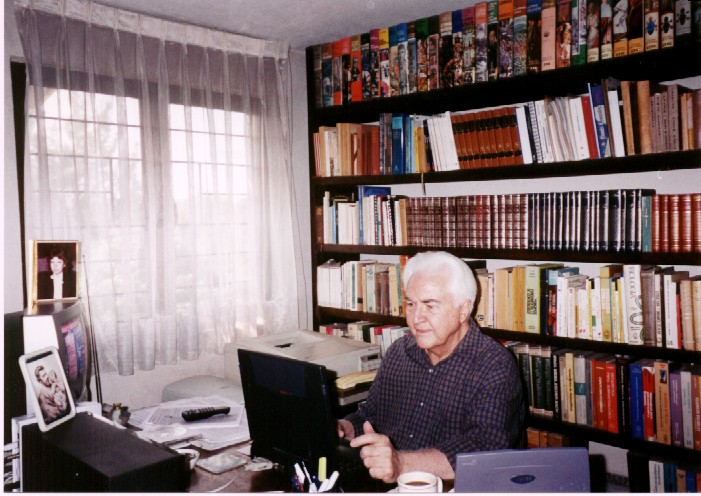We Are Losing Love
Life became hard (1)
Losing love the feeling of dissatisfaction is global, with some exceptions, and we wonder, almost never thoroughly, what is wrong in our lives.
Perhaps losing love the great majority does not even achieve an acceptable response to the previous approach, without having the willingness to "waste time" in such a nonprofit concern. And so, we keep fighting and running ... between the legs of the horses!
Brief pre-article:
I have found it difficult to write this article, because there are many issues involved: from the gradual spousal and family deterioration, through the demands of the consumer society, to the rush and tensions in which we usually live. I can't cover so many topics in a single article. You must get to the root of the problem and from there continue to specify and understand the subproblems that arise. Maybe then we can find at least some partial solutions.
It seems incredible, but we don't want to think about it. This is an issue that we shy away from almost defensively. When we shy away from it, we let our guard down and are defenseless. What is the reason for this paradoxical attitude? It seems that we instinctively fear that the remedy may be more painful than the disease, or that achieving personal satisfaction and peace may be less joyous than saving the effort required to put in the appropriate means.
The evasion of this topic is presented acutely today, when it's treatment becomes more imperative than ever. The help of Philosophy is essential to tackle arduous problems with openness and objectivity, without commitment, self-righteousness or complacency. In what follows I will try to address this problem, and my basic diagnosis will be that we are losing love. I hope I will not be evaded too, but that you will read me and give me at least the benefit of the doubt.
Although the articles in this series can be read independently, there is a relationship between them; due to which the reading of each one will be better exploited if it is related to the readings of the others, which can be found activating the link that is offered below:
Life became hard or contextual index
Article body:
Perhaps in the articles of this series it is intended, more than in others, the already known general objective of all my articles: to help live more humanely in a world that pushes us to live with an increasing acceleration, almost without thinking, running towards an uncertain goal and without a sense that satisfies our deep longings.
The crisis of losing love has become acute and evident above all in the marital society. Just a few decades ago, the following reaction was given in a wedding couple when he was called to the front lines: she asked him to marry immediately, to love at least a few nights; and so that, if he died in the war, he would leave her at least one son, as the fruit of his love.
How would a wedding couple react today in such circumstances? Perhaps she would react thinking this way: First, I will let him go to war, then I will see if he returns and how he returns. Only then will I decide if I still want to marry him.
We are losing love and forgetting how to love
Yes, it's true, we are forgetting how to love! We are losing that skill, that ability, that virtue. In Neurotic Anonymous groups ―who run the same 12-step program as Alcoholics Anonymous― neurosis is said to consist precisely of a lack of the ability to love, or the deficiency of losing love. And today our world is neurotic.

Faced with difficulties, our grandparents found a wonderful solution by saying the following: Nothing matters, even if the world collapses, while you and I still have each other.
Today, on the other hand, either spouse can and usually says to the other something like this: It doesn't take the world to collapse for you to have problems. I will be your main problem ―to the extreme of abandoning you and taking the children with me― if you don't give me this or that. And this or that may well be a simple convenience, a taste or even a whim.
Our grandparents, like all spouses, sometimes had lawsuits; but then ... the happy ones came! Today, however, the reason for the lawsuit is to want to be happy. Neither spouse wants to be an "object of pleasure," so he easily rejects the other. When one invites the other to an activity that he likes, he usually receives this response: "Do you want me to accept, after what you did to me?"
Thus it is impossible to lead a pleasant life. We have also lost the ability to forgive, and even to do in common what we like. The reproach that can be done to the other receives a supremacy card. And if this happens in conjugal love, which is love par excellence, what will not happen in other loves?
Happiness and love
What I have said is taken from experience and backed by the destruction of countless marriages mainly by the deficiency of losing love; It is not about mental elucidations. On the other hand, speaking of love in general, Philosophy teaches us that to love is to want the good of the other. And it is true, to love is to leave oneself and look for the other ―he or she―, for his sake, to give him pleasure, to make him really happy. Happiness is, paradoxically, in the disinterest of true love, when looking for the other, and not for oneself. Happiness is not found by seeking it directly, but only by bouncing, by directly seeking the happiness of the other.
But we have been losing that conviction; we don't usually think like that anymore. Today we prefer to think that we must look first for ourselves, and only later for others: first me!, and then the others, even against the most elementary norms of urbanity. Thus some modern currents of cheap psychology have become fashionable; and his naive followers end up paying the price of misfortune. It is a basically selfish attitude, because it revolves around oneself, self, ego.
Living with such a person, sooner or later becomes something heavy, or very heavy, and there is no other choice but to retire, even if some superficial contacts are maintained with him; which causes the selfish person, little by little, to be left alone, or to have only superficial relationships; situation that undoubtedly frustrates him and leads him to misery. Why that person is losing love?

The result of not having or losing love is that the selfish person, by depriving himself of deep personal relationships, replaces them with material things, which provide short-term pleasure. The selfish person changes what inwardly he could be ―a person who truly loves― for what he can have outwardly, and thus he opts for the culture of having with preference to the culture of being.
We well know that the things we have do not provide us with happiness, as those skates, or those dolls, or that motorcycle, or that car did not... nor those lands, houses, planes, sailboats or vices. And yet we prefer to continue falling into deception, in order to continue avoiding the underlying issue. Deep down... we well know that we have only tried bliss when we have truly loved, even if it was a bliss accompanied by the pain of not being reciprocated as we wanted, perhaps because we did not have due regard for the point of view of the other respect to his personal correspondence.
And when we have met some of those rare people who are genuinely happy, we have discovered that they are invariably people who truly love, who is never losing love, and that they are very understanding of the correspondence they receive from others, whose views they fully respect. In short, they are people who do not love possessively, but give themselves by loving; people who look first for the loved one, and then for themselves.
Bliss and pain
It is possible that bliss in this life be accompanied by pain. This is not only possible, but so it is: in this life, bliss, however authentic, is always accompanied by pain, mainly due to lack of love or the deficiency of losing love! The question is therefore summed up in the following: why should we choose between seeking happiness or avoiding pain? What do we prefer to be, seekers of happiness or pain evaders? Why are we losiong love?
Because there is no way out: since happiness is always accompanied by pain in this life, would we choose to avoid pain, and succeed, in this life happiness would always escape us. Why are we losiong love?
The previous approach allows us to weigh different types of morality, and even different types of religions. Morality can have the aproach of more haters of evil than lovers of good, more haters of error than lovers of truth, or all the contrary. There are also differences between religions. For example, and without disrespecting Buddhists, it is true that Buddhism is an evader of pain more than a seeker of bliss. Some religions are lovers of God more than haters of the Devil. It is also true that authentic Christianity is a seeker of bliss more than an evader of pain, a lover of truth more than a hater of error, a lover of good more than a hater of evil, a lover of God more than a hater of the Devil. Why are we losiong love?
The renowned psychologist Karen Horney, in her book The Neurotic Personality of Our Time, already mentioned a first contradiction as the cause of the widespread neurosis: On the one hand, everything possible is done to propel us towards success, which means that we should not only try to impose ourselves, but also to be aggressive and able to turn others out of our way. On the other hand, we are deeply imbued with Christian ideals.
Everything indicates, therefore, that losing love the problems we have in our hands take their roots in the old theme of love, and in our way of approaching it; because, whether we want it or not, we were made to love, and to know, and to work. If we rebel against this reality, or if we ignore it, we will be miserable ―since we cannot change our nature or redesign ourselves―; on the other hand, if we accept it, we will gradually find happiness.
It will be interesting, in future articles, to analyze the causes that induce us to this rebellion in our time, or that losing love, in one way or another distract us and move us away from the deep considerations that can help us avoid boredom and make sense of our lives.
Lea esta página en español. Read this page in Spanish.
Google - Translator - Traductor
Recent Articles. Lo nuevo.
-
index de Paz Cristiana Ensemble nos ayuda a buscar y lograr la paz
Jul 20, 23 10:59 AM
Index de Paz Cristiana Ensemble suele descubrir los errores de lo establecido. Se trata de la paz personal, que sin duda contribuye al logro de la paz social. -
Sobre este sitio, aclara el sitio Paz Cristiana Ensemble, sobre la paz
Jul 01, 23 10:29 PM
Sobre este Sitio, Se clara que Sea Bilingue, Espanol-Ingles. Aqui se Ofrecen las Claves para Descubrir los Usuales Errores de lo Socialmente Establecido. -
Misericordia divina continua habla del paso de infinita a extrema
Dec 25, 21 12:30 PM
Misericordia divina continua da una explicación razonable de la continuidad de la misericordia infinita a la extrema
This website seeks peace, first personal and then social. It tries to discover and correct the mistakes that have been established in the main aspects of our lives: politics, morals, values, religion, etc. This can be seen as something aggressive, without actually being so. It's important to read with a broad mind and without prejudice, with a critical and constructive attitude.

